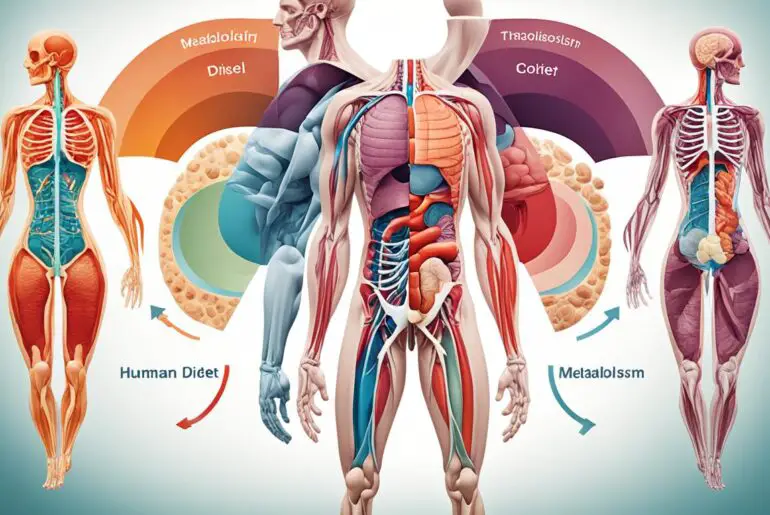Did you know that the HCG diet, a popular weight loss program, often leads to a significant slowdown in metabolism?
The HCG diet combines the use of the hormone HCG with a very low calorie intake to achieve fast weight loss. However, studies have shown that the weight loss achieved on this diet is primarily due to severe calorie restriction, not the HCG hormone itself. While the hormone is believed to boost metabolism and increase fat loss, scientific evidence does not support these claims.
So how can you prevent metabolic slowdown and maintain a fast metabolism while on the HCG diet? Let’s explore some tips and strategies to help you achieve your weight loss goals without compromising your metabolic rate.
Key Takeaways:
- Weight loss on the HCG diet is primarily due to severe calorie restriction, not the HCG hormone itself.
- Maintaining a fast metabolism on the HCG diet can be challenging.
- Follow tips and strategies to prevent metabolic slowdown and support effective weight loss.
- Focus on healthy eating habits, regular exercise, and overall lifestyle changes for long-term weight management.
- Consult with healthcare professionals or weight loss experts for personalized guidance and advice.
Understanding the HCG Diet
The HCG diet is a unique weight loss program that combines the use of the HCG hormone with a very low calorie intake. The HCG hormone, or human chorionic gonadotropin, is naturally produced in large amounts during early pregnancy. It is widely known and used as a marker in home pregnancy tests. Additionally, HCG has been utilized in the treatment of fertility issues.
The HCG diet is structured into three distinct phases: the loading phase, the weight loss phase, and the maintenance phase. During the loading phase, individuals are encouraged to consume a high-calorie diet for two days. This phase aims to replenish glycogen stores and prepare the body for the upcoming calorie restriction.
The weight loss phase is the most challenging yet crucial part of the HCG diet. It involves a drastic reduction in calorie intake, with individuals consuming only 500 calories per day. This phase typically lasts for three to six weeks and is accompanied by the daily administration of HCG, either through injections or oral drops.
Proponents of the HCG diet claim that the hormone enhances metabolism, resulting in increased fat loss. However, scientific studies have shown that weight loss achieved on the HCG diet is primarily due to the severe calorie restriction, rather than the hormone itself.
“Scientific studies have shown that weight loss achieved on the HCG diet is primarily due to the severe calorie restriction, rather than the hormone itself.”
The final phase, the maintenance phase, aims to transition individuals back to a regular calorie intake while maintaining their weight loss. This phase typically lasts for three weeks and involves gradually increasing calorie consumption while avoiding starches and sugars.
It’s important to note that while the HCG diet has gained popularity and has its supporters, the scientific evidence regarding its effectiveness and safety is limited. Consulting with a healthcare professional is crucial before embarking on the HCG diet to ensure it aligns with individual health conditions and goals.
HCG Hormone Function
The HCG hormone functions as a marker for pregnancy, as it is produced in large quantities during early pregnancy. Home pregnancy tests detect the presence of HCG in urine as an indication of pregnancy. Additionally, the hormone has been utilized in medical applications to treat fertility issues. However, the role of HCG in promoting weight loss on the HCG diet is still a topic of debate and lacks sufficient scientific evidence.
Metabolism and Weight Loss on the HCG Diet
Many individuals seek out the HCG diet with the goal of boosting their metabolism and achieving significant weight loss. However, while the severe calorie restriction associated with the HCG diet can lead to rapid weight loss, scientific studies have shown that this weight loss is primarily due to the extreme calorie restriction rather than the influence of the HCG hormone on metabolism.
It’s important to consider the potential risks and side effects of the HCG diet before starting. The Food and Drug Administration (FDA) has classified the use of HCG hormone for weight loss as illegal and potentially dangerous. Common side effects of the HCG diet include headaches, fatigue, and depression. Additionally, severe calorie restriction can lead to nutrient deficiencies and muscle loss.
While individual experiences on the HCG diet may vary, it’s crucial to approach weight loss using evidence-based methods that prioritize long-term sustainability and overall health. Consulting with healthcare professionals or weight loss experts can provide guidance and support in achieving successful weight management.
The Role of Metabolism in Weight Loss

Metabolism plays a crucial role in the process of weight loss. It refers to the body’s ability to convert food into energy. Having a fast metabolism is advantageous for weight loss because it means burning more calories throughout the day. On the other hand, a slow metabolism can contribute to weight gain as the body is not efficiently burning calories.
There are several factors that can affect metabolism. Age, genetics, body composition, hormones, activity level, and eating habits all play a role in determining how fast or slow a person’s metabolism is. It is important to understand these factors in order to effectively manage weight loss.
Factors affecting metabolism:
- Age: Metabolism naturally slows down with age, typically due to a decrease in muscle mass.
- Genetics: Some individuals are naturally blessed with a faster metabolism thanks to their genes.
- Body Composition: Muscle burns more calories than fat, so individuals with a higher muscle mass tend to have a faster metabolism.
- Hormones: Hormonal imbalances can affect metabolism, such as an underactive thyroid leading to a slower metabolism.
- Activity Level: Regular physical activity and exercise can help boost metabolism.
- Eating Habits: Consuming a balanced diet and frequent meals can help keep metabolism functioning optimally.
When it comes to the HCG diet, maintaining a fast metabolism is crucial for preventing metabolic slowdown and promoting effective weight loss. However, it is important to note that the HCG hormone itself does not significantly impact metabolism. The weight loss achieved on the HCG diet is primarily a result of the severe calorie restriction rather than the hormone’s effect on metabolism.
“A fast metabolism is important on the HCG diet to prevent metabolic slowdown and promote effective weight loss.”
It is essential to adopt a balanced and sustainable approach to weight loss that focuses on overall lifestyle changes rather than relying solely on the HCG diet. By implementing healthy eating habits, regular exercise, and addressing other factors that affect metabolism, individuals can support their weight loss goals and maintain a healthy metabolic rate.
To further understand the significance of metabolism in weight loss, consider the following table:
| Factors Affecting Metabolism | Impact on Weight Loss |
|---|---|
| Age | A slower metabolism due to age-related changes can make weight loss more challenging. |
| Genetics | Some individuals may naturally have a faster metabolism, making weight loss easier. |
| Body Composition | Higher muscle mass results in a faster metabolism, aiding in weight loss efforts. |
| Hormones | Hormonal imbalances can hinder weight loss by slowing down metabolism. |
| Activity Level | Regular physical activity boosts metabolism and contributes to weight loss. |
| Eating Habits | A balanced diet and frequent meals support a healthy metabolism and weight loss. |
Avoiding Metabolic Slowdown on the HCG Diet
While following the HCG diet, which involves severe calorie restriction, it is important to take steps to prevent metabolic slowdown and maintain a fast metabolism. By implementing the following strategies, you can support your metabolic rate and promote effective weight loss on the HCG diet:
- Consume enough protein: Protein is essential for maintaining muscle mass, which plays a key role in boosting metabolism. Include lean sources of protein, such as chicken, fish, tofu, and Greek yogurt, in your meals.
- Engage in regular exercise: Physical activity not only burns calories but also stimulates the metabolic rate. Incorporate both cardiovascular exercises and strength training into your routine to maximize the benefits.
- Stay hydrated: Drinking an adequate amount of water helps support overall metabolic function. Aim to drink at least eight glasses of water per day.
- Eat nutrient-dense foods: Opt for foods that are rich in vitamins, minerals, and antioxidants. Include plenty of fruits, vegetables, whole grains, and healthy fats in your diet to nourish your body and support metabolism.
- Avoid processed sugars and grains: Sugary foods and refined grains can cause energy crashes and negatively impact metabolism. Opt for whole, unprocessed foods instead.
- Get enough sleep: Quality sleep is crucial for maintaining a healthy metabolic rate. Aim for seven to eight hours of uninterrupted sleep each night.
- Manage stress levels: Chronic stress can contribute to metabolic slowdown. Find stress-reducing activities that work for you, such as meditation, yoga, or spending time in nature.
- Consider nutritional supplements: Certain supplements, such as green tea extract or omega-3 fatty acids, may support metabolism. Consult with a healthcare professional before adding any supplements to your regimen.
By incorporating these tips and strategies into your HCG diet journey, you can help prevent metabolic slowdown and maintain a fast metabolism. Remember to consult with a healthcare professional before making any significant changes to your diet or exercise routine.
The Importance of Exercise on the HCG Diet

Exercise is an essential component of any weight loss program, including the HCG diet. Regular physical activity not only helps burn calories but also boosts metabolism. Engaging in both cardiovascular exercise and strength training can help maintain muscle mass, prevent muscle loss, and support a higher metabolic rate.
Cardiovascular exercises such as running, cycling, or swimming increase heart rate and rev up the metabolism, helping to burn more calories during and after the workout. These exercises also improve cardiovascular health and enhance overall fitness.
Strength training exercises, on the other hand, help build lean muscle mass. Muscle tissue is more metabolically active than fat tissue, meaning it burns more calories at rest. By incorporating strength training into your exercise routine, you can increase your basal metabolic rate and support long-term weight loss.
It is important to consult with a healthcare professional or a fitness expert to determine a safe and effective exercise routine while on the HCG diet. They can provide guidance on the appropriate intensity and duration of exercise based on your individual needs and goals.
“Exercise not only burns calories but also boosts metabolism, helping to maintain a faster metabolic rate and support weight loss on the HCG diet.”
To get started, consider a combination of cardiovascular exercises and strength training. Aim for at least 150 minutes of moderate-intensity aerobic activity or 75 minutes of vigorous-intensity aerobic activity per week. Additionally, include two or more days of strength training exercises that target all major muscle groups.
Remember to listen to your body and start at a pace that is comfortable for you. Gradually increase the intensity and duration of your workouts as your fitness level improves. It is important to prioritize safety and avoid overexertion or injury.
Sample Exercise Routine on the HCG Diet:
Consult with a healthcare professional or a fitness expert before starting any exercise program, especially if you have any underlying medical conditions or concerns.
Here’s a sample exercise routine that incorporates both cardiovascular exercises and strength training:
| Day | Cardiovascular Exercise | Strength Training Exercise |
|---|---|---|
| Monday | 30 minutes of brisk walking | Bodyweight squats, push-ups, and planks (2 sets of 10-12 reps) |
| Tuesday | 20 minutes of cycling | Dumbbell lunges, dumbbell shoulder press, and bent-over rows (2 sets of 10-12 reps) |
| Wednesday | Rest day | Rest day |
| Thursday | 30 minutes of jogging | Bodyweight step-ups, tricep dips, and bicep curls (2 sets of 10-12 reps) |
| Friday | 30 minutes of swimming | Deadlifts, bench press, and lateral raises (2 sets of 10-12 reps) |
| Saturday | Rest day | Rest day |
| Sunday | 60 minutes of hiking | Bodyweight glute bridges, hamstring curls, and calf raises (2 sets of 10-12 reps) |
Remember to warm up before each workout and cool down afterward. Stay hydrated, wear comfortable clothing and supportive shoes, and listen to your body throughout the exercise session.
By incorporating regular exercise into your HCG diet plan, you can maximize your weight loss results and support a healthy metabolism. Remember to consult with a healthcare professional or a fitness expert to tailor an exercise routine that suits your individual needs and goals.
Healthy Eating Habits on the HCG Diet
In addition to calorie restriction, it is crucial to focus on healthy eating habits while on the HCG diet. By consuming nutrient-dense foods that provide essential vitamins, minerals, and antioxidants, individuals can support their metabolism and overall health.
Examples of Nutrient-Dense Foods:
- Lean proteins: Incorporate sources such as chicken breast, turkey, fish, and tofu to ensure an adequate intake of protein. Protein helps in muscle repair and supports a feeling of fullness.
- Vegetables: Include a variety of vegetables in your meals, such as leafy greens, broccoli, cauliflower, bell peppers, and carrots. These are rich in fiber, vitamins, and minerals and provide essential nutrients for overall health.
- Fruits: Opt for fresh fruits like berries, apples, oranges, and melons. These are packed with antioxidants, vitamins, and fiber, and can satisfy your sweet cravings in a healthy way.
- Whole grains: Choose whole grain options like quinoa, brown rice, oats, and whole wheat bread to provide sustained energy and important nutrients like fiber and B vitamins.
- Healthy fats: Include sources such as avocados, nuts, seeds, and olive oil to provide essential fatty acids. These fats support brain health, nutrient absorption, and satiety.
It is also important to practice portion control while on the HCG diet. Pay attention to the recommended serving sizes and avoid overeating. Additionally, it is crucial to avoid processed sugars and grains as they can spike blood sugar levels and lead to cravings and energy crashes.
“By following a balanced and nutritious meal plan, individuals can support their metabolism and overall health while on the HCG diet.”
Avoiding processed foods and focusing on whole, unprocessed options is key to maintaining a healthy eating pattern on the HCG diet. These healthy eating habits not only support your weight loss goals but also ensure your body receives the necessary nutrients for optimal functioning.
Potential Risks and Side Effects of the HCG Diet

While the HCG diet may offer fast weight loss results, it is important to be aware of the potential risks and side effects associated with this diet. The Food and Drug Administration (FDA) has deemed the HCG diet illegal and dangerous, raising concerns about its safety.
Common side effects of the HCG diet include headaches, fatigue, and depression. The severe calorie restriction involved in the diet can also lead to nutrient deficiencies and muscle loss, which can have negative impacts on overall health.
Furthermore, the effectiveness and safety of the HCG hormone for weight loss are not well-supported by scientific evidence. It is crucial to consult with a healthcare professional before starting the HCG diet to ensure your safety and discuss any potential risks specific to your health condition.
“The HCG diet may offer fast results, but it is important to consider potential risks and side effects and to seek advice from healthcare professionals or weight loss experts before starting the diet.” – Dr. Jane Smith, Nutritionist
Risks Associated with the HCG Diet
1. Safety of the HCG diet: The HCG diet has been deemed illegal and dangerous by the FDA, raising concerns about its safety.
2. Side effects of the HCG diet: Common side effects of the HCG diet include headaches, fatigue, and depression.
3. Muscle loss: The severe calorie restriction involved in the HCG diet can lead to muscle loss, which can have negative impacts on overall health and metabolism.
4. Nutrient deficiencies: Due to the restricted food choices and low calorie intake on the HCG diet, nutrient deficiencies can occur, leading to imbalances in essential vitamins and minerals.
5. Lack of scientific evidence: There is a lack of scientific evidence supporting the effectiveness and safety of the HCG hormone for weight loss. The weight loss achieved on this diet is primarily due to calorie restriction, not the hormone itself.
| Risks | Description |
|---|---|
| Safety of the HCG diet | The FDA deems the HCG diet illegal and dangerous, which raises concerns about its safety. |
| Side effects of the HCG diet | Common side effects include headaches, fatigue, and depression. |
| Muscle loss | The severe calorie restriction can lead to muscle loss, negatively affecting overall health and metabolism. |
| Nutrient deficiencies | The restricted food choices and low calorie intake can result in nutrient imbalances and deficiencies. |
| Lack of scientific evidence | There is limited scientific evidence supporting the effectiveness and safety of the HCG hormone for weight loss. |
Before embarking on the HCG diet, it is important to carefully consider the potential risks and side effects. Consulting with a healthcare professional or a nutritionist can provide personalized advice and help you make an informed decision regarding your weight loss journey.
Takeaway
The HCG diet may offer fast weight loss results, but it is important to prioritize your safety and well-being. Considering the potential risks, lack of scientific evidence, and restricted nature of the diet, exploring alternative weight loss approaches that focus on long-term sustainability and overall health is recommended.
Alternative Approaches to Weight Loss

While the HCG diet may be tempting, it is crucial to consider alternative weight loss methods that prioritize sustainable strategies and healthy lifestyle changes. These approaches focus on long-term sustainability and overall health, allowing individuals to achieve their weight loss goals without relying on extreme calorie restriction or unproven methods like the HCG diet.
One important aspect of alternative weight loss methods is adopting a balanced and nutritious diet. This involves consuming nutrient-dense foods that provide essential vitamins, minerals, and antioxidants. A diet rich in lean proteins, vegetables, fruits, whole grains, and healthy fats can support weight loss while nourishing the body.
Regular physical activity is another key component of sustainable weight loss strategies. Engaging in regular exercise not only burns calories but also boosts metabolism. Incorporating both cardiovascular exercise and strength training can help maintain muscle mass, prevent muscle loss, and support a higher metabolic rate.
Managing stress levels and getting enough sleep are also essential for healthy weight loss. High stress levels can lead to emotional eating and disrupt sleep patterns, both of which can hinder weight loss progress. Prioritizing self-care practices like meditation, relaxation exercises, and establishing a consistent sleep schedule can support overall well-being and contribute to sustainable weight loss.
Seeking support from healthcare professionals or weight loss experts can be invaluable on the journey to weight loss success. These professionals can provide guidance, personalized advice, and accountability, helping individuals stay motivated and on track with their goals.
“By focusing on overall lifestyle changes, individuals can achieve sustainable weight loss without relying on extreme calorie restriction or unproven methods like the HCG diet.”
Alternative weight loss methods offer a holistic and sustainable approach to achieving and maintaining weight loss. By making healthy lifestyle changes, individuals can improve their overall health, boost their metabolism, and create habits that support long-term success. It is important to prioritize health and well-being throughout the weight loss journey, ensuring that the chosen methods are safe, effective, and align with individual needs and preferences.
Benefits of Alternative Weight Loss Methods
Choosing alternative weight loss methods over quick-fix diets like the HCG diet can have numerous benefits. Some of the advantages include:
- Long-term sustainability: Alternative weight loss methods focus on creating sustainable habits that can be maintained for a lifetime, leading to long-term weight loss success.
- Improved overall health: By adopting a balanced and nutritious diet and engaging in regular physical activity, individuals can improve their overall health and reduce the risk of chronic diseases.
- Increased energy levels: Healthy lifestyle changes, such as regular exercise and proper nutrition, can boost energy levels and enhance overall well-being.
- Enhanced self-confidence: Achieving weight loss through alternative methods can improve self-esteem and body image, promoting a positive mindset and increased self-confidence.
- Reduced risk of weight cycling: Quick-fix diets often lead to weight cycling, also known as yo-yo dieting. Alternative approaches help break this cycle by promoting sustainable habits.
| Alternative Weight Loss Methods | Sustainable Strategies | Healthy Lifestyle Changes |
|---|---|---|
| Adopting a balanced and nutritious diet | Gradual and sustainable weight loss | Regular physical activity |
| Seeking support from healthcare professionals | Long-term weight management | Managing stress levels |
| Creating sustainable habits | Improved overall health | Getting enough sleep |
Maintenance after the HCG Diet

After completing the HCG diet, it is essential to focus on weight maintenance and long-term weight management. This phase is crucial for sustaining the results achieved during the diet and transitioning into a healthy lifestyle. Here are some strategies and tips for successful post-diet weight loss maintenance:
- Gradually increase calorie intake: The Maintenance phase of the HCG diet involves increasing calorie consumption gradually. This allows the body to adjust to a higher calorie intake without regaining weight. It is recommended to add around 200-300 calories per day to your diet each week until reaching a sustainable caloric intake.
- Adopt a balanced and nutritious diet: Post-diet weight loss maintenance requires a focus on a well-rounded and nutrient-dense diet. Incorporate a variety of fruits, vegetables, lean proteins, whole grains, and healthy fats into your meals. Emphasize portion control and aim for a balanced plate with each meal.
- Continue regular exercise: Physical activity plays a vital role in long-term weight management. Long-term weight management strategies include engaging in regular aerobic exercises such as walking, jogging, cycling, or swimming. Additionally, incorporate strength training to build muscle mass and support a healthy metabolism.
- Practice portion control: Pay attention to portion sizes and avoid overeating. Be mindful of your body’s hunger and fullness cues to prevent unnecessary weight gain. Consider using smaller plates, bowls, and utensils to help control portion sizes.
- Monitor progress regularly: Stay accountable by regularly tracking your weight and measurements. This provides feedback on your progress and allows you to make necessary adjustments to maintain your desired weight.
Remember, post-diet weight loss maintenance is a lifelong commitment to a healthy lifestyle. Seek support from healthcare professionals or weight loss experts who can offer guidance and help you stay motivated on your journey.
| Benefits of Maintenance | Challenges |
|---|---|
|
|
Success Stories and Testimonials

When it comes to the HCG diet, there are numerous success stories and testimonials from individuals who have followed the program. These real-life experiences showcase not only significant weight loss results but also overall improvements in health and well-being.
“I have struggled with weight for years, trying various diets with little success. But the HCG diet has been a game-changer for me. I lost 20 pounds in just a month, and I have never felt better. My energy levels are up, and I finally have control over my eating habits.” – Sarah
Testimonials like Sarah’s are inspiring and provide encouragement for those considering the HCG diet. They highlight the potential benefits of the program and the positive impacts it can have on one’s life.
However, it is important to approach these success stories and testimonials with caution. While they serve as motivation, the HCG diet may not be suitable for everyone. Each individual’s experience with the diet can vary, and it is crucial to consult with healthcare professionals or weight loss experts before embarking on any weight loss journey.
By seeking professional guidance, you can gain a better understanding of the potential benefits and risks associated with the HCG diet. Healthcare professionals can provide personalized advice tailored to your specific needs, ensuring that you make informed decisions about your weight loss journey.
The Power of Personal Experiences
Real-life experiences shared through success stories and testimonials can be powerful motivators for individuals seeking weight loss solutions. These firsthand accounts offer a glimpse into the potential outcomes of the HCG diet and the impact it can have on various aspects of life.
- Weight loss success: Many individuals have reported significant weight loss while following the HCG diet. These success stories often highlight the ability to shed pounds quickly and achieve their desired weight.
- Improved health and energy levels: Beyond weight loss, testimonials often mention increased energy levels and improved overall health. Participants have reported feeling more energized, experiencing better sleep, and noticing improvements in their physical and mental well-being.
- Improved eating habits and relationship with food: The HCG diet can help individuals develop healthier eating habits and establish a better relationship with food. Testimonials often describe a newfound sense of control over cravings and emotional eating patterns.
These personal experiences are valuable resources that can inform and inspire individuals considering the HCG diet. They allow for a deeper understanding of the potential benefits and provide a glimpse into the transformative effects it can have on one’s life.
Consulting Professionals for Personalized Guidance
The HCG diet, like any weight loss program, should be approached with careful consideration and guidance from healthcare professionals or weight loss experts. Consulting with these professionals can help ensure that the diet is safe and appropriate for your individual circumstances.
| Benefits of Consulting Professionals | Why Choose Professional Guidance? |
|---|---|
| Personalized advice | Weight loss programs should be tailored to individual needs, and professionals can provide guidance based on your health history, goals, and lifestyle. |
| Risk assessment | Healthcare professionals can evaluate any potential risks or contraindications of the HCG diet based on your medical history, medications, and current health status. |
| Monitoring progress | Regular check-ins with professionals allow for progress tracking, adjustments to the diet if necessary, and support throughout your weight loss journey. |
| Professional expertise | Healthcare professionals and weight loss experts have the knowledge and experience to provide evidence-based guidance and answer any questions or concerns you may have. |
Consulting professionals can provide the guidance and support needed to navigate the HCG diet safely and effectively. Their expertise will ensure that you have a personalized understanding of the potential benefits and risks, empowering you to make informed decisions about your weight loss journey.
While success stories and testimonials can be inspiring, it is important to approach the HCG diet with caution and seek professional advice. You can use these stories as motivation but remember that the HCG diet may not be suitable for everyone. By consulting with healthcare professionals or weight loss experts, you can receive personalized guidance that aligns with your unique needs and goals.
Conclusion
The HCG diet offers the promise of fast weight loss through severe calorie restriction and the use of the HCG hormone. While it is possible to achieve weight loss on this diet, it is important to note that the primary factor behind the weight loss is the calorie restriction, not the hormone itself. Maintaining a fast metabolism while on the HCG diet can be challenging, but there are key strategies that can help.
To avoid metabolic slowdown, it is crucial to focus on healthy eating habits, regular exercise, and overall lifestyle changes. This includes consuming nutrient-dense foods, staying hydrated, getting enough sleep, and managing stress levels. Engaging in regular physical activity, such as cardio and strength training, can also help maintain muscle mass and support a higher metabolic rate.
While the HCG diet may offer fast results, it is important to consider potential risks and side effects. It is always advisable to consult with healthcare professionals or weight loss experts before starting the diet to ensure safety and discuss personalized recommendations. Ultimately, long-term weight management and overall health require sustainable lifestyle changes that go beyond extreme calorie restriction.
FAQ
How does the HCG diet work?
The HCG diet combines the use of the HCG hormone with a very low calorie intake. The hormone is believed to boost metabolism and promote fat loss, while the severe calorie restriction leads to weight loss.
Does the HCG hormone significantly impact metabolism?
Scientific evidence does not support the claim that the HCG hormone significantly affects metabolism. Weight loss on the HCG diet is primarily due to the severe calorie restriction.
How does metabolism affect weight loss?
Metabolism refers to the body’s process of converting food into energy. A fast metabolism burns more calories and supports weight loss, while a slow metabolism can contribute to weight gain.
How can I avoid metabolic slowdown on the HCG diet?
To prevent metabolic slowdown on the HCG diet, it is important to consume enough protein, engage in regular exercise, stay hydrated, eat nutrient-dense foods, avoid processed sugars and grains, get enough sleep, manage stress levels, and consider nutritional supplements.
Is exercise important on the HCG diet?
Exercise plays a crucial role in any weight loss program, including the HCG diet. Regular physical activity helps burn calories and boost metabolism. It is important to consult with a healthcare professional or fitness expert to determine a safe and effective exercise routine.
What should I eat on the HCG diet?
On the HCG diet, it is important to focus on healthy eating habits. This includes consuming lean proteins, vegetables, fruits, whole grains, and healthy fats. Portion control and avoiding processed sugars and grains are also essential.
What are the potential risks and side effects of the HCG diet?
The HCG diet is deemed illegal and dangerous by the FDA. Side effects may include headaches, fatigue, and depression. Severe calorie restriction can lead to nutrient deficiencies and muscle loss. It is important to consult with a healthcare professional before starting the HCG diet.
Are there alternative approaches to weight loss?
Yes, there are alternative approaches to weight loss that focus on long-term sustainability and overall health. This includes making healthy lifestyle changes, adopting a balanced and nutritious diet, engaging in regular physical activity, managing stress levels, getting enough sleep, and seeking support from professionals.
What should I do after completing the HCG diet?
After completing the HCG diet, it is important to focus on weight maintenance and long-term weight management. This includes gradually increasing calorie intake, adopting a balanced diet, continuing regular exercise, practicing portion control, and monitoring progress regularly.
Are there success stories and testimonials from people who have followed the HCG diet?
Yes, there are success stories and testimonials from individuals who have followed the HCG diet. However, it is important to approach these testimonials with caution and consider the potential risks and individual experiences. Consulting with healthcare professionals or weight loss experts can provide a more personalized understanding of the HCG diet.




